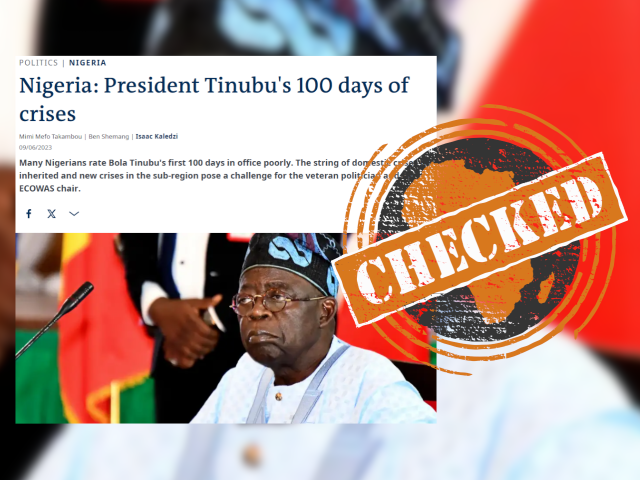This article is more than 5 years old
Services over 50% of GDP, oil 87.7% of exports
With crude oil prices fluctuating recently, President Muhammadu Buhari’s administration has repeatedly promised to diversify the economy by developing its non-oil sectors.
In February 2018 the government appointed Olusegun Awolowo to head the Nigerian Export Promotion Council, which works to increase exports of other, non-oil products. Awolowo was previously appointed to the position in 2013.
In an interview with Nigeria's New Telegraph newspaper in August 2018, Awolowo said the country’s economy was already diversified to some degree.
“It’s not oil that is driving our GDP,” Awolowo was quoted as saying. “Oil is just about 9%, agriculture is also about 27%, but what is driving our GDP is services, financial services, communication services, IT services.”
“So [I’m] telling you that the economy is diversified but oil is still 90% of our foreign exchange, that’s the currency that comes to the country”.
Are Awolowo’s claims about Nigeria’s economy correct?
Awolowo confirmed to Africa Check he was correctly quoted, and that by “driving” he meant services contributed the most to Nigeria’s gross domestic product, or GDP.
He said his figures were from the government’s Economic Recovery and Growth Plan 2017-2020, which aims to grow and diversify the economy.
GDP is a measure of the total value of goods and services produced in a country and bought by final users in a period of time, such as a year. It is a count of the output generated within the borders of a country.
Awolowo referred us to Table 3.1 in the growth plan, which lists the contribution different sectors made to Nigeria’s GDP in 2015, based on estimates by the National Bureau of Statistics.
In the table, services lead with 53.2%, followed by agriculture at 23.1%. Oil’s contribution in 2015 was just 9.6%.
The statistics bureau’s most recent data on Nigeria’s GDP are estimates for the second quarter of 2018. The report presents industries’ contribution to GDP in two ways.
They are first grouped into the agriculture, industries and services sectors. Then they are split into oil and non-oil sectors.
The report estimates that from April to May 2018, agriculture contributed 22.86% to Nigeria’s GDP, industries 23.18% and services 53.97%.
The oil sector made up 8.55% of GDP and the non-oil sector 91.45%.
Oil contributes less than 10% to GDP because most companies in the sector aren’t Nigerian, Prof Usman Muttaka of the Ahmadu Bello University economics department told Africa Check.
“Unlike services and agriculture, the oil sector is dominated by companies from other economies. These foreign oil companies repatriate large chunks of the profit to their respective countries.”
The services sector makes up more than half of Nigeria’s GDP, according to recent yearly and quarterly estimates. We therefore rate Awolowo’s claim that services are “driving” GDP as correct.
Nigeria earns foreign exchange by exporting goods and services out of the country, the Central Bank of Nigeria explains.
The statistics bureau’s most recent foreign trade data shows that in the first quarter of 2018, Nigeria earned N4.69 trillion (US$153.4 billion) from exports.
Sales of crude oil made up 76.3% of Nigeria’s export earnings from January to March 2018, bringing in N3.58 trillion (US$11.7 billion). Processed oil products like condensates and lubricants earned another N535.8 billion, or US$ 1.75 billion, contributing 11.4% to export earnings.
In total, crude oil and oil products made up 87.7% of Nigeria’s foreign exchange earnings in the first quarter of 2018.
“The fact that we produce so little processed products, such as manufactured items, means that our export is dominated by crude oil,” Ayo Teriba, the chief executive of Economic Associates, told Africa Check. “Due to infrastructure failure, oil and agriculture are Nigeria’s main exports, while services dominate the economy.”
Sales of crude oil and processed oil products together made up 87.7% of Nigeria’s export earnings in the first three months of 2018. We therefore rate Awolowo’s claim that “oil is still 90% of our foreign exchange” as mostly correct.
Further reading:
https://africacheck.org/reports/how-many-barrels-of-oil-stolen-a-day-in-nigeria-buhari-may-be-in-right-ballpark-with-250000-claim/
https://africacheck.org/2014/04/09/what-do-nigerias-new-gdp-numbers-really-mean/
- Export council head Olusegun Awolowo said Nigeria’s gross domestic product was driven by the services sector, while oil still made up 90% of foreign exchange.
- In the most recent dataset, services contributed over 50% to GDP.
- Data from early 2018 showed oil contributed 87.7% to foreign exchange.
With crude oil prices fluctuating recently, President Muhammadu Buhari’s administration has repeatedly promised to diversify the economy by developing its non-oil sectors.
In February 2018 the government appointed Olusegun Awolowo to head the Nigerian Export Promotion Council, which works to increase exports of other, non-oil products. Awolowo was previously appointed to the position in 2013.
In an interview with Nigeria's New Telegraph newspaper in August 2018, Awolowo said the country’s economy was already diversified to some degree.
“It’s not oil that is driving our GDP,” Awolowo was quoted as saying. “Oil is just about 9%, agriculture is also about 27%, but what is driving our GDP is services, financial services, communication services, IT services.”
“So [I’m] telling you that the economy is diversified but oil is still 90% of our foreign exchange, that’s the currency that comes to the country”.
Are Awolowo’s claims about Nigeria’s economy correct?
Awolowo confirmed to Africa Check he was correctly quoted, and that by “driving” he meant services contributed the most to Nigeria’s gross domestic product, or GDP.
He said his figures were from the government’s Economic Recovery and Growth Plan 2017-2020, which aims to grow and diversify the economy.
GDP is a measure of the total value of goods and services produced in a country and bought by final users in a period of time, such as a year. It is a count of the output generated within the borders of a country.
Awolowo referred us to Table 3.1 in the growth plan, which lists the contribution different sectors made to Nigeria’s GDP in 2015, based on estimates by the National Bureau of Statistics.
In the table, services lead with 53.2%, followed by agriculture at 23.1%. Oil’s contribution in 2015 was just 9.6%.
Oil profits go to other countries
The statistics bureau’s most recent data on Nigeria’s GDP are estimates for the second quarter of 2018. The report presents industries’ contribution to GDP in two ways.
They are first grouped into the agriculture, industries and services sectors. Then they are split into oil and non-oil sectors.
The report estimates that from April to May 2018, agriculture contributed 22.86% to Nigeria’s GDP, industries 23.18% and services 53.97%.
The oil sector made up 8.55% of GDP and the non-oil sector 91.45%.
Oil contributes less than 10% to GDP because most companies in the sector aren’t Nigerian, Prof Usman Muttaka of the Ahmadu Bello University economics department told Africa Check.
“Unlike services and agriculture, the oil sector is dominated by companies from other economies. These foreign oil companies repatriate large chunks of the profit to their respective countries.”
The services sector makes up more than half of Nigeria’s GDP, according to recent yearly and quarterly estimates. We therefore rate Awolowo’s claim that services are “driving” GDP as correct.
Nigeria earns foreign exchange by exporting goods and services out of the country, the Central Bank of Nigeria explains.
The statistics bureau’s most recent foreign trade data shows that in the first quarter of 2018, Nigeria earned N4.69 trillion (US$153.4 billion) from exports.
Sales of crude oil made up 76.3% of Nigeria’s export earnings from January to March 2018, bringing in N3.58 trillion (US$11.7 billion). Processed oil products like condensates and lubricants earned another N535.8 billion, or US$ 1.75 billion, contributing 11.4% to export earnings.
In total, crude oil and oil products made up 87.7% of Nigeria’s foreign exchange earnings in the first quarter of 2018.
“The fact that we produce so little processed products, such as manufactured items, means that our export is dominated by crude oil,” Ayo Teriba, the chief executive of Economic Associates, told Africa Check. “Due to infrastructure failure, oil and agriculture are Nigeria’s main exports, while services dominate the economy.”
Sales of crude oil and processed oil products together made up 87.7% of Nigeria’s export earnings in the first three months of 2018. We therefore rate Awolowo’s claim that “oil is still 90% of our foreign exchange” as mostly correct.
Further reading:
https://africacheck.org/reports/how-many-barrels-of-oil-stolen-a-day-in-nigeria-buhari-may-be-in-right-ballpark-with-250000-claim/
https://africacheck.org/2014/04/09/what-do-nigerias-new-gdp-numbers-really-mean/





Add new comment